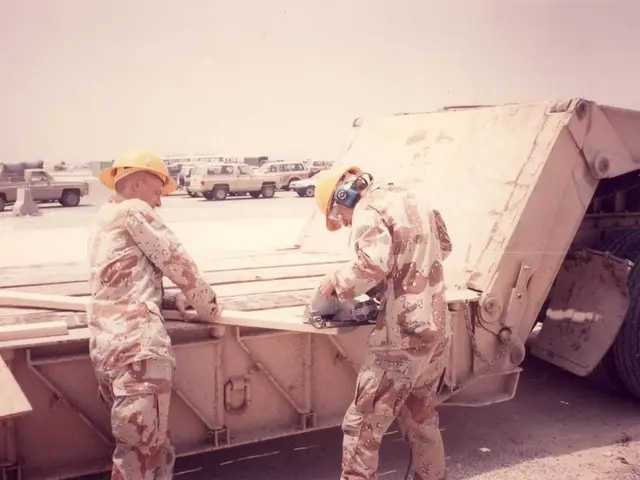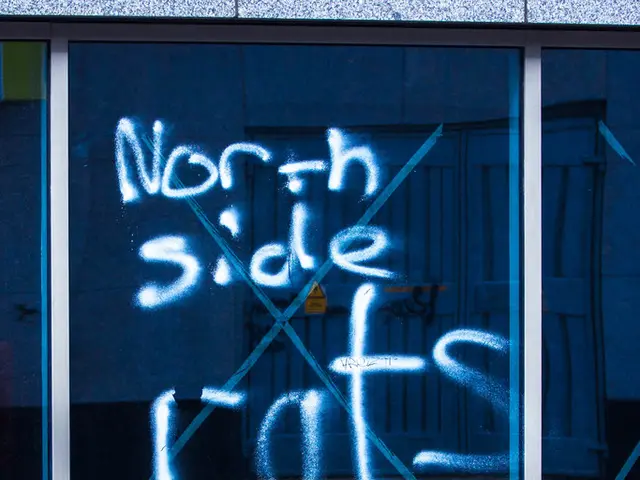Pakistan claims to possess reliable intelligence indicating an imminent Indian attack within a few days.
Update from the India-Pakistan Border Crisis
Tensions between India and Pakistan are escalating once again, sending shockwaves throughout the region, following the deadly attack in Indian-controlled Kashmir. Pakistan claimed they have "solid intel" that India is planning to attack in the next few days, threatening a strong retaliation.
India, on the other hand, has given their military complete autonomy to decide on the response to the incident in Pahalgam, which they blame Pakistan for supporting. The region, split between India and Pakistan, is claimed in its entirety by both nations, leading to decades of conflict.
Call for Cool Heads
Pakistan accuses India of preparing for a military action in the coming 24-36 hours based on baseless accusations. Yet, India's government officials emphasized that Prime Minister Narendra Modi has granted the armed forces unrestricted authority to decide response strategies.
Last week's tragedy, which left 26 casualties, most of whom were Indian tourists, was claimed by a new militant group called Kashmir Resistance. New Delhi labels all militancy in Indian-controlled Kashmir as Pakistan-backed terrorism, while Pakistan denies this claim, and many Muslim Kashmiris see the militants as a homegrown freedom struggle.
Global leaders are urging caution to avoid a confrontation with potential devastating consequences. U.N. Secretary-General Antonio Guterres and U.S. Secretary of State Marco Rubio both appealed for peace and stability in South Asia.
Pakistan's Foreign Minister Ishaq Dar vowed that Pakistan will not be the initial aggressor but implicitly warned of a powerful retaliation should India act first.
Meanwhile, Pakistan's army spokesperson, Lt. Gen. Ahmad Sharif, emphasized their readiness to face the challenge: "If they think aggression is the solution, our message is crystal clear: We are ready, don't test us." Pakistan did not provide details about the "credible intelligence" they cited.
Forced Departures
India ordered Pakistani citizens to leave the country, with exceptions for those on medical visas. Despite the deadline, many families remained scrambling to reach the border crossing in Attari town in northern Punjab state, with some being deported by police.
Saara Khan, a Pakistani mother forcibly deported without her Indian passport holding husband, implored: "We request the government not to displace our families." Khan has been living in Indian-controlled Kashmir since 2017.
Other cross-border diplomatic measures include the suspension of visas, a recall of diplomats, and the cancellation of water-sharing agreements. New Delhi closed its border with Pakistan while Islamabad shut its airspace to Indian airlines.
India announced the closure of its airspace to all Pakistani aircraft until May 23rd. Gunfire exchanges between soldiers have increased along the Line of Control, the de facto border that separates Kashmiri territory between the two rivals.
Fatal Encounters
Survivors recounted the terrifying events of last week’s attack, stating that the gunmen specifically targeted Hindu men and shot them at close range. Among the victims were a local Muslim pony ride operator and a Nepalese citizen, along with the majority of tourists.
Aishanya Dwivedi, whose husband was among the casualties, described her husband being approached by an attacker who insisted he recite the Islamic declaration of faith. Dwivedi said, "When he refused, the attacker shot him point-blank in the head."
This latest chapter in the ongoing India-Pakistan crisis continues to unfold, with the situation remaining tense and volatile. International diplomats encourage both nations to engage in dialogue and work towards a peaceful resolution.
- The escalating tensions between India and Pakistan over the recent attack in Indian-controlled Kashmir have sparked concern in global media, with political leaders urging both nations to avoid war-and-conflicts that could have devastating consequences.
- The ongoing India-Pakistan crisis, marked by deadly attacks and forced departures, is not only a matter of general-news for these two countries but also a concern for the international community, as it involves war-and-conflicts and politics, and could potentially disrupt regional media and business relations.






